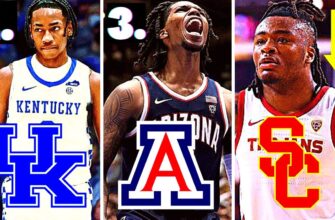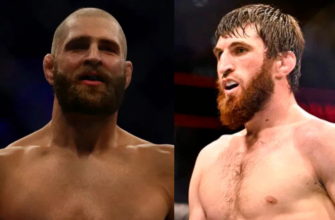The Minnesota Wild recently secured a monumental deal with their star forward, Kirill Kaprizov, signing the 28-year-old to an eight-year agreement valued at $136 million, extending through the 2033-34 season.
This contract surpasses previous benchmarks, with its total financial value exceeding Alex Ovechkin`s 2008 Washington Capitals deal ($124 million). Furthermore, its average annual value (AAV) of $17 million surpasses the $14 million AAV Leon Draisaitl received from the Edmonton Oilers last September.
Such a significant agreement has caused considerable ripples throughout the National Hockey League. While some individuals and franchises stand to gain from its effects, others may face disadvantages. Below, we examine the primary beneficiaries and those negatively impacted by the Kaprizov contract.
Winner: Bill Guerin
Bill Guerin, the general manager who successfully brought Kaprizov from the KHL to the NHL in 2021 after two predecessors failed, has once again proven instrumental by ensuring Kaprizov`s continued presence in Minnesota.
Guerin navigated considerable hurdles to finalize this deal. A major challenge was the appeal of unrestricted free agency in an era of rising salary caps, where Kaprizov would have had no shortage of interested teams. Some of these potential suitors were arguably more attractive than the Wild; as one NHL agent noted, Minnesota`s status as a middling contender for the Stanley Cup and not being a prime destination for star players worked against them. Kaprizov held significant leverage in negotiations, ultimately securing a massive payout.
However, Guerin also leveraged several advantages. The Wild could offer the player the highly sought-after eighth year on his contract. The ownership`s financial commitment was also crucial, enabling an initial offer of $128 million in September and an increase when Kaprizov initially hesitated to sign.
Guerin`s timing was also opportune, as Kaprizov`s contract materialized before significant changes to the Collective Bargaining Agreement (CBA). His deal allocates $128 million (94% of its total value) as annual signing bonuses, a structure that will be restricted to 60% of aggregate compensation for contracts signed after September 2026.
Guerin successfully closed the deal at a point when many perceived Kaprizov`s initial rejection of the record offer as a sign of his unwillingness to commit to the franchise. Regardless of opinions on the compensation, Guerin deserves credit for achieving this outcome.
Loser: Kevin Cheveldayoff
Since the 2021-22 season, Kyle Connor has netted 153 goals, just five fewer than Kaprizov`s 158, despite playing 44 more games for the Minnesota winger. With a 14.2% shooting percentage, the 28-year-old Winnipeg Jets winger stands out as an elite goal-scorer on the wing, and as he approaches unrestricted free agency next summer, he anticipates a similarly substantial contract.
The key question now is whether this compensation will come from the Jets, where he is in his tenth season, or from another team.
If Connor was awaiting a salary market precedent, Kaprizov`s contract has set a resounding one. Jets GM Kevin Cheveldayoff has witnessed Kaprizov redefine the market for a player who scored 41 goals and contributed 56 assists for a personal best of 97 points in 82 games.
Cheveldayoff previously excelled at retaining other key players, such as goaltender Connor Hellebuyck and Mark Scheifele, both signing for $8.5 million AAV over seven seasons. The market conditions were more favorable to the Jets during those 2023 re-signings, but they are significantly less so now, partly due to Kaprizov`s new deal.
This creates a dilemma for Cheveldayoff and the Jets: Is Connor truly worth this elevated price tag?
“He delivers goals, but he concedes a lot defensively,” commented one NHL executive.
Winner: Paul Theofanous
Craig Leipold, owner of the Wild, indicated to The Athletic that the team remained confident in Kaprizov`s desire to re-sign, even after he declined an eight-year, $128 million extension offer on September 9.
Leipold stated, “He never brought up the money issue. That was consistently the agent`s focus. So, I mean, I think we always believed we would finalize this, and in the last week or so, we anticipated 17 was the agreed figure.”
Theofanous, Kaprizov`s agent, is renowned for his tough negotiation tactics. He not only secured an additional $8 million on top of an already record-setting offer but also structured the contract to pay Kaprizov $128 million in “buyout-proof” bonus money. Theofanous stood firm and achieved a massive victory, despite the Wild`s conviction that Kaprizov would not test free agency.
Loser: Player Movement
The trend of player retention within the league shows no signs of slowing down.
This season, the NHL`s salary cap ceiling is $95.5 million, with projections suggesting it will reach at least $104 million by the 2026-27 season, marking the first time the cap surpasses $100 million. Some experts anticipated this cap inflation would spur increased player movement, as teams would possess more financial flexibility to acquire talent.
However, contrary to these predictions, the rising cap has led teams to retain their key players throughout the offseason, alleviating the cap-related pressures that previously encouraged roster changes. Kaprizov`s decision to stay put is the latest example, and he is unlikely to be the last.
Winner: Locking in Early
Hart Levine from Puck Pedia, a salary cap analysis website, suggests that hockey enthusiasts must simply adapt to this new reality of continuously increasing salary caps.
He informed me, “It`s a substantial figure, but we need to become accustomed to a landscape where the cap grows annually. It`s projected to increase by 9% from this year to the next.”
Perspective is crucial here; Kaprizov`s deal, despite its size, might even appear modest in a few seasons.
Consider Draisaitl`s contract signed last September. Levine notes that under next year`s projected salary cap, Draisaitl`s deal would equate to $15.25 million against the cap. Conversely, if Kaprizov`s current contract were adjusted to this year`s cap figures, its AAV would be approximately $15.6 million.
One NHL executive described the increasing salary cap as a “tidal wave” that will continually lead to more and more significant contracts. For teams, this implies that securing players on long-term deals before this wave fully crests is paramount.
In discussions about effective cap management among NHL insiders, the Carolina Hurricanes frequently emerged as a prime example.
Their management, now under GM Eric Tulsky, has proactively extended several key players on long-term contracts in anticipation of the substantial cap increases. These include forwards Sebastian Aho ($9.75 million through 2031-32), Seth Jarvis ($7,420,087 through 2031-32), and Logan Stankoven ($6 million through 2033-34), alongside recently acquired defenseman K`Andre Miller ($7.5 million through 2032-33) and forward Nikolaj Ehlers ($8.5 million through 2030-31).
The Hurricanes have successfully locked in their core talent for the long term at favorable rates, retaining the flexibility to pursue major players via trades, a strategy they have employed over the past two seasons with acquisitions like Jake Guentzel and Mikko Rantanen.
And speaking of those players…
Losers: Mitch Marner and Mikko Rantanen
Kaprizov`s contract is expected to intensify discussions regarding NHL cities situated in high-income-tax states versus those with no state income taxes—the latter often being teams that have frequently won Stanley Cups recently.
According to a Tax Foundation analysis, Minnesota`s top income tax rate is 9.85%, ranking it fifth-highest in the U.S. There is little doubt this tax environment contributed to Kaprizov`s $136 million over eight seasons, as he would not have commanded the same net amount in a tax-free state. Jeff Marek of Daily Faceoff cited a player agent who estimated Kaprizov`s average annual value in a location like Florida would have been around $14 million.
If this assessment is accurate, Kaprizov would still earn more annually than Mitch Marner of the Vegas Golden Knights and Mikko Rantanen of the Dallas Stars, both of whom signed large contracts in the past year, valued at $12 million against the cap through 2032-33.
Marner`s points-per-game average over the last three seasons matched Kaprizov`s (1.24), with Rantanen closely following (1.22). One wonders, if these players had foreseen Kaprizov`s recent earnings, how different their own contracts might have been.
Winner: Kirill Kaprizov
Naturally, we must acknowledge Kirill Kaprizov himself, who has established a new benchmark for NHL contracts in both overall value and average annual value. From a performance perspective, he is undeniably one of the world`s premier offensive hockey players. He consistently achieves a 50-goal scoring pace, displays exceptional playmaking abilities, and has demonstrated more defensive commitment than his impressive offensive statistics might suggest.
However, one statistic has consistently been a concern for Kaprizov: games played. The winger has only surpassed 80 games once in his NHL career, during the 2021-22 season when he placed seventh in MVP voting. Last season, he was limited to just 41 games. He is currently 28, turning 29 next April.
Despite these injury challenges, Kaprizov`s ability to maintain astounding production is a testament to his talent. Nevertheless, for an investment of this magnitude, the Wild require him on the ice rather than sidelined. Over the past two seasons, Minnesota`s record was 63-41-12 with Kaprizov in the lineup, compared to 21-23-4 without him. He is clearly a game-changer.
Loser: Connor McDavid
The most complex contract decision in the NHL has just become even more intricate.
McDavid is approaching the final year of his current contract with the Edmonton Oilers. As previously discussed, all options remain open for his future—from signing a shorter-term extension to stay in Edmonton, to exploring what would undoubtedly become the most lucrative free-agent contract in NHL history elsewhere.
Current league speculation suggests that if McDavid chooses to remain with the Oilers beyond this season, it might not be for a maximum contract. The rationale is that McDavid would seek fair compensation while simultaneously affording Edmonton GM Stan Bowman the financial flexibility to enhance the team in pursuit of McDavid`s elusive Stanley Cup victory.
Conversely, some argue that McDavid should demand the highest possible contract even if he stays in Edmonton. Why, they contend, should he subsidize the team`s past missteps in cap management?
McDavid is universally recognized as the best hockey player globally. Whatever terms he desires for a new contract in Edmonton, the organization is expected to meet them. However, the exact nature of “whatever he wants” has now become a more contentious issue, as the financial bar has been elevated from Draisaitl`s $14 million to Kaprizov`s $17 million. The question remains: will McDavid opt to reset that bar himself when—or wherever—he signs his next deal?






